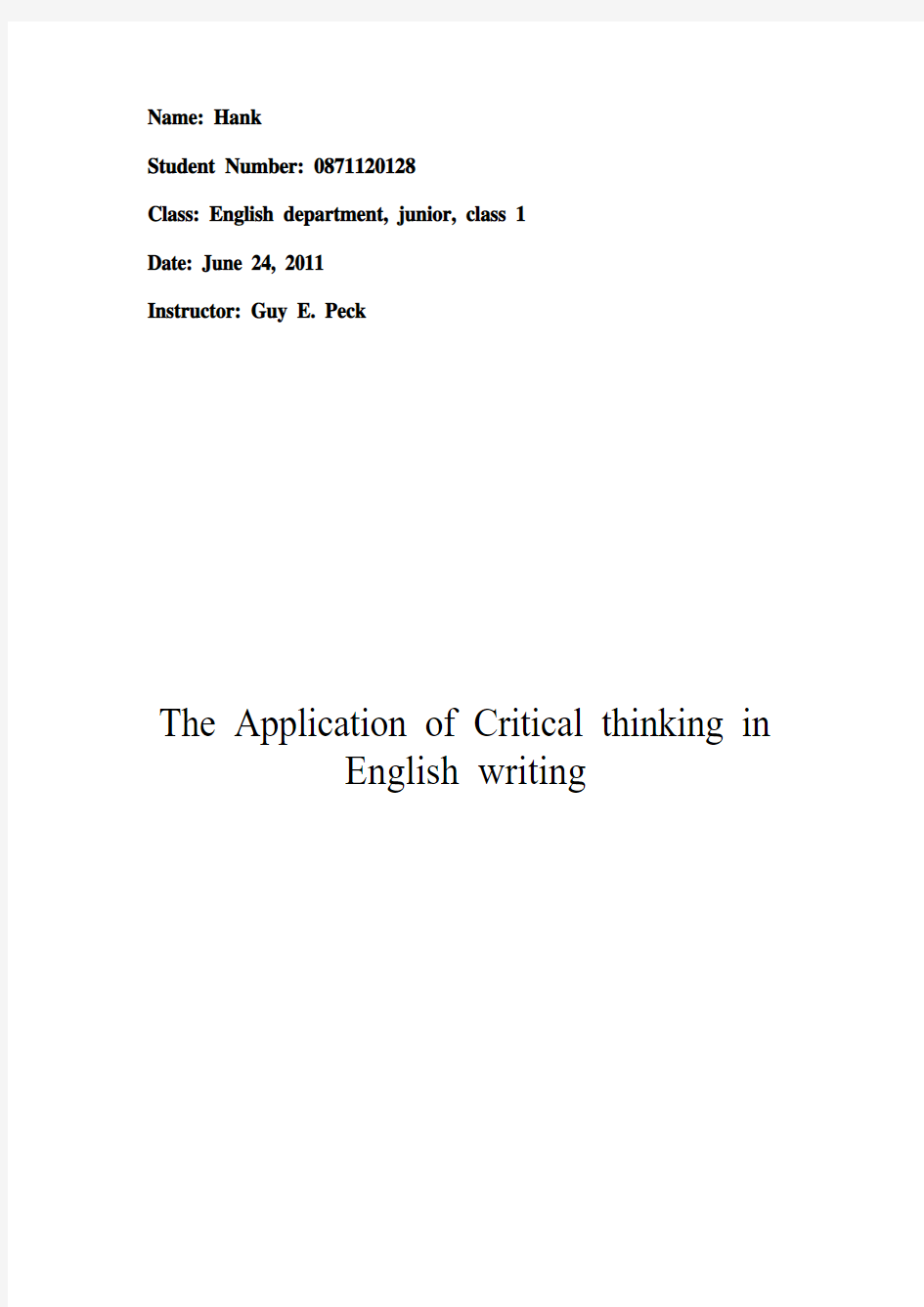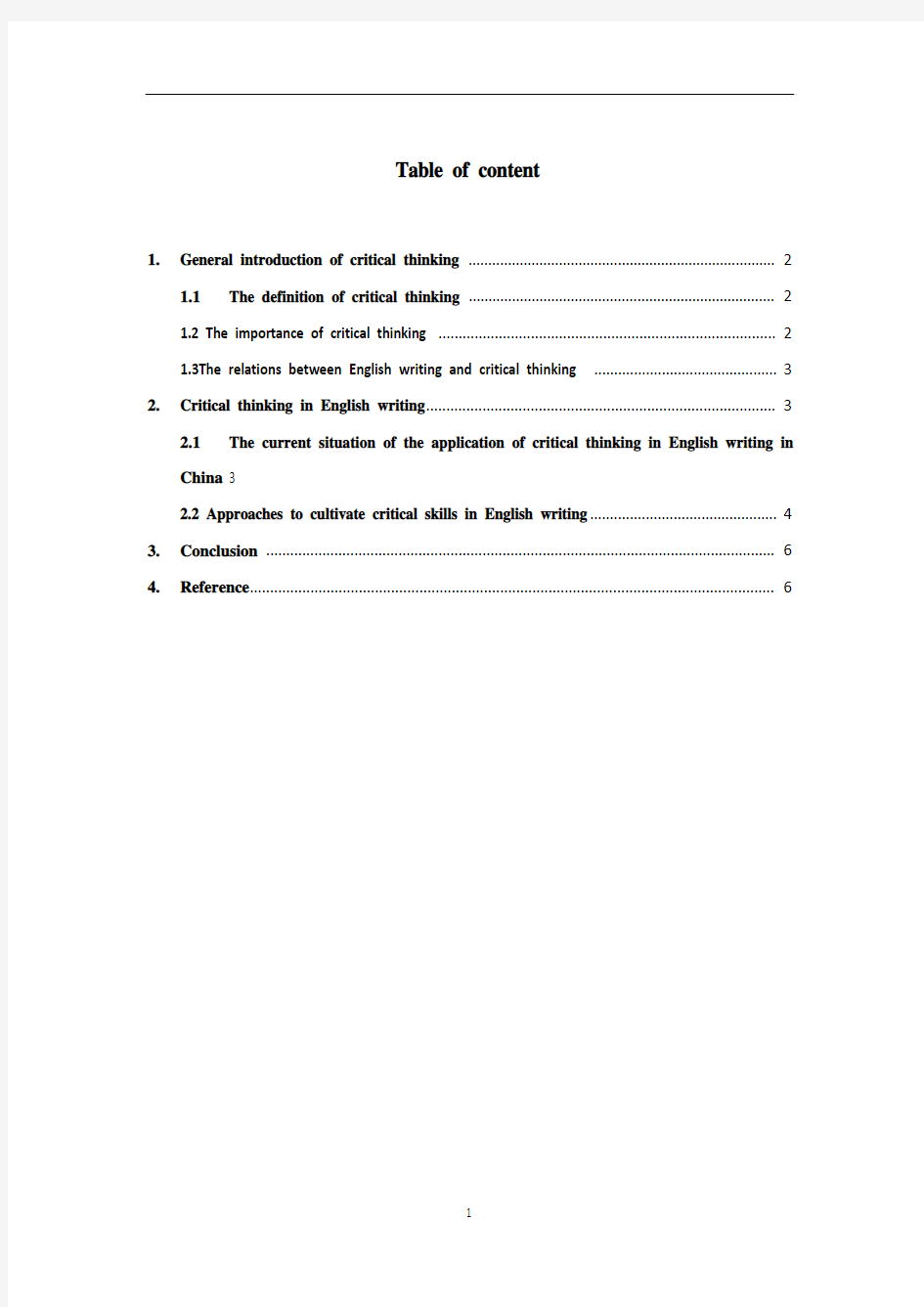the application of critical thinking in english writing


Name: Hank
Student Number: 0871120128
Class: English department, junior, class 1
Date: June 24, 2011
Instructor: Guy E. Peck
The Application of Critical thinking in
English writing
Table of content
1.General introduction of critical thinking (2)
1.1The definition of critical thinking (2)
1.2 The importance of critical thinking (2)
1.3The relations between English writing and critical thinking (3)
2.Critical thinking in English writing (3)
2.1The current situation of the application of critical thinking in English writing in
China3
2.2 Approaches to cultivate critical skills in English writing (4)
3.Conclusion (6)
4.Reference (6)
1.General introduction of critical thinking
1.1The definition of critical thinking
Many people equate the idea of critical thinking with a criticism of what other people are doing, or finding fault, which is not accurate. However, the definition of critical thinking varies from one to another. So, in order to form an idea of the characteristics of critical thinking, we have to take a look at the derivation of “critical”. The word “critical” is derived from the root form “skeri”①, which means to cut, separate, or sift; and is also related to the Greek word “kriterion”②, which means “a standard of judging”③. Thus, critical thinking is an inevitable complex process in human mind to evaluate and to judge information based on certain standard. Moreover, it is difficult to set fixed cr iteria of “standard”. “Thus, people should question what happens around them in order to decide what to believe and to do”④. After this analysis, I define critical thinking as “sets of disciplined steps taken to activate human intellectual thinking which is based on adequate information, evidence, analysis and inference, to ponder before believing in new arguments”.
1.2 The importance of critical thinking
The definition of critical thinking implies that it is an important element of all professional fields and academic disciplines. In other words critical thinking principles are universal. Besides, the importance of critical thinking also lies in that it enables one to analyze, evaluate, explain, and restructure their thinking, thereby decreasing the risk of adopting, acting on, or thinking with, a false belief. However, even with knowledge of the methods of logical inquiry and reasoning, mistakes can happen due to a thinker's inability to apply the methods or because of character traits
such as egocentrism. Fortunately, this kind of character traits can be overcame through critical thinking for it includes identification of prejudice, bias, propaganda, self-deception, distortion and misinformation.
1.3The relations between English writing and critical thinking
Writing can be difficult because it’s not completely a linear process.While we recommend a structure that seems to suggest it (i.e. research, outline, draft and edit), the reality is that the actual work of writing is usually a lot more dynamic. We do not think for one hour and then write the next – they are intertwined and should be well organized otherwise our writings will not be convincing. It is for this reason that I believe writing to be a great way to enhance our critical thinking abilities. While we may have a clear idea about a topic before we write, it is not uncommon to challenge that during the actual writing process. Most of the time, one idea can receive numerous alterations during writing. That’s not bad.We are training our mind to think critically. In addition, since writing involves much of our faculties, this openness to challenging our ideas can also lead to a sharper faculty.
In return, critical thinking also helps improve our writing skills. Thinking critically means stepping away from the emotions involved and looking at things in a more scientific manner. This can prevent us from having the problem of being too attached to one specific part of what we write. We will be able to edit our work better because we can think logically instead of emotionally.
2.Critical thinking in English writing
2.1The current situation of the application of critical thinking in English writing
in China
E. M. Forester once queried, “How do I know what I think until I see what I say
⑤”?This question captures the essence of write-to-learn philosophy in education. Writing can and should be used to help students discover what they know or think about a subject. Writing assignments should be geared toward helping students get to know their own thoughts. However, there is a phenomenon that students of English major in our country are apt to imitate and follow others writings as well as think in one-sided and superficial way while writing. A case in point is that, a study of writings from 120 different English major students shows that less than 20% of them were written in a well-founded and logical way. Just like Cao De Ming, a famous scholar, once pointed that “Heavy imitat ion and mechanical practice may easily make students slackened in thinking, questioning and researching which resulted in follow thinking”⑥. It is really a worrying situation. Therefore, in order to improve myself in English writing and help others write more persuasively, I would like to introduce approaches to cultivate critical thinking abilities in English writing.
2.2 Approaches to cultivate critical skills in English writing
In order to achieve the goal of thinking critically, joint efforts from both teachers and students should be taken. For teachers, when beginning a writing session, for example, teachers have to state the writing expectation clearly to the students so that they will have clear directions about what to write. Students are required to write a four-paragraph essay on personal topics, such as the advantages or disadvantages of Internet; thus, students are expected to provide supporting sentences to back up their topic sentence. Teachers should help students elicit and organize their ideas as well as their language. Most of the time, students have to revise their work several times to achieve the “maximum possible accuracy and clarity” .During the revision, they need another person to give comments and feedback on their writing; thus, it is essential for teachers to help students with the revision. It is an arduous way for students to go through the whole steps in writing; therefore, the teachers’ role is very crucial.
For students, they should take the most responsibility for their writings. First,
since the way people read will determine how they write; thus, reading critically will help them to write more critically. Students should learn to analyze the writing of others, noting focus, arrangement, logical development, vocabulary, and style. Students should also learn the difference between reading information and reading literary art as well as learn to acknowledge how their experiences and attitudes limit, enable, and determine their responses to texts. Second, students should learn writing as a process of various problem-solving tasks, including planning, discovering, drafting, revising, and editing. Besides, students have to learn that this process is situational: different purposes and audiences for writing demand distinct writing processes and presentation formats. Third, Students should learn to view writing as an act of communication rather than solely an act of private expression. They should learn about the issues and responsibilities entailed in composing concise, vivid, and coherent prose for a general readership and specific audiences. Fourth, Students should learn the basic textual conventions of academic writing, including the personal essay, expository writing, analysis, and argument, as well as understand the need to fulfill readers’ expectations about focus, organization, development, and voice in each. Students should learn the conventional forms and functions of paragraphs and develop the ability to use various sentence patterns and to edit for correctness, variety, and correct usage.
Fifth, Students should be introduced to rhetoric and understand the dramatic and situational nature of communication. Understood as the art of discovering, evaluating, and communicating knowledge in response to the ideas of others, rhetoric reminds us that writing is the means, not the end of communication, the evidence of a writer’s desire to affect a particular audience through crafted prose for a specific purpose. Sixth, Students should take critical thinking as an active, purposeful, and organized process that we use to make sense of the world. They should learn to evaluate the quality of their ideas as well as the ideas of others. Seventh, Students should be familiar about how language is a value-laden tool for discovering and communicating ideas. Students should recognize how a language-user is always a language-chooser who promotes or inhibits further thinking, communication, and
action.
3.Conclusion
Since critical thinking involves scientific methods of thinking and the principles of critical thinking are universal together with the special link it held with English writing, the study of critical thinking deserves more attention, especially in china. Besides, I hope, in particular, the priority of studying critical can be given to the cultivation of critical thinking abilities. Another point needs mentioning is that the application of critical thinking in other professional and academic fields should be improved.
4.Reference
1.http: //https://www.360docs.net/doc/f18452223.html,
2.IBID
3.Ennis, R. H,Critical Thinking. New Jersey: Prentice- Hall, 1996, page
132-133.
4.IBID, page 185-186.
5. E.M Forester, Book of Love. Cambridge University Press, 1986, page 17.
6. 何其莘,殷桐生,黄源深,刘海平,<<关于外语专业本科教育改革的若干意
见>>,外语教学与研究,1999,page63.
